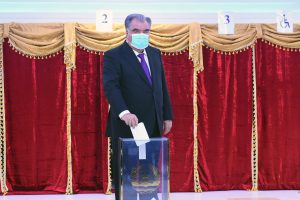90.92 percent — that’s the vote share claimed by Tajikistan’s President Emomali Rahmon in the country’s recent presidential election. According to the country’s Central Election Commission (CEC), turnout soared to 85.4 percent — handing Rahmon an impressive victory if it could be believed.
“Election” here, of course, means a ceremonial demonstration of democracy, without competition or a real role for citizens to make their thoughts and desires heard via the ballot box. It’s the performative acts of democracy absent the spirit of it. The CEC reported no violations, though RFE/RL’s Tajik Service noted instances of apparent ballot stuffing and so-called family voting, in which one family member casts multiple ballots on behalf of their relatives. The practice is technically illegal. There were no credible foreign observers present for the vote. While there were five candidates in total, there was no serious debate on policy between them or much actual campaigning.
Rahmon engineered himself a victory with years of crackdowns on opposition groups, manipulation of the laws to prevent new contenders from rising, and simple intimidation of any new faces announcing their intent to participate in politics.
With his preordained victory, Rahmon retains his position as the longest-serving leader in the former Soviet Union, beating out Belarus’ embattled Alexander Lukashenko by almost two years.
Rahmon’s rule will now be extended through 2027. Last week, commenting on the election, political science professor Hélène Thibault stated that “It’s the aftermath of the election that really matters. Everyone is wondering when is the succession of power going to take place.”
At 68, Rahmon could very well have another full seven year term in him, but analysts expect he will be looking for a stable moment to pass the baton. Given the control his extended family exerts on government and business in the country, the expectation is that Rahmon intends his family to retain control beyond him. Before the coronavirus pandemic pulled the rug out from under 2020, many analysts expected this year’s election to be a moment of transition. Constitutional changes made in 2016, which lowered the age limit to run for president from 35 to 30, opened the way for Rahmon’s son, 32-year-old Rustam Emomali, to run for president. Emomali is currently serving both as the mayor of Dushanbe and chairman of the Senate.
It’s that second role — chairman of the Senate — which is particularly indicative of what could be in Rahmon’s grand plan. According to the Tajik Constitution, if the president steps down or dies in office, it’s the chairman of the Senate who takes up the reins of power. Furthermore, Rahmon — as Leader of the Nation — will retain plenty of power even after he leaves the presidency.
Kazakhstan presents a template for managed transition, albeit without the same monarchal vibes: Nursultan Nazarbayev resigned from the presidency in March 2019 and the chairman of the Senate, Kassym-Jomart Tokayev, became acting president. Tokayev then scheduled a snap election for June 2019, which he handily won. Meanwhile, Nazarbayev retains a lifetime role in the state as chair of the country’s security council.
What’s next for Tajikistan is a likely shuffling of cabinet members, which tea-leaf reading Tajikistan analysts will watch carefully.
































